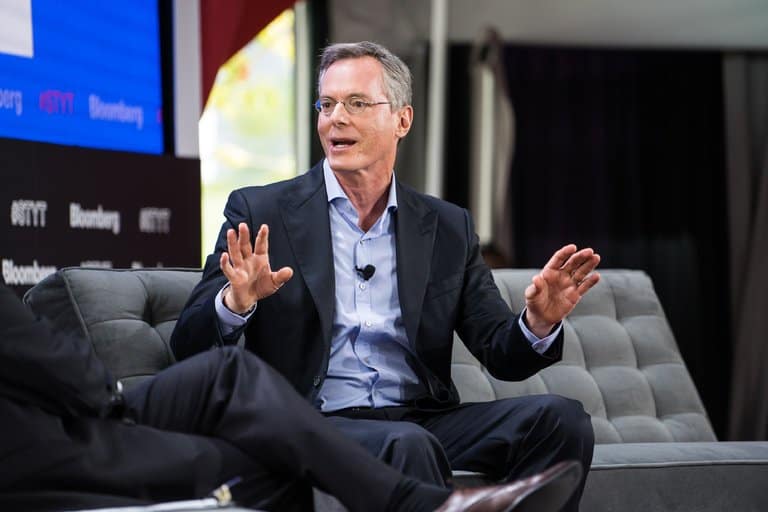
SAN FRANCISCO — Qualcomm was co-founded in 1985 by Irwin Jacobs, who took the company public and made it a mobile chips behemoth. He later passed the baton to his son Paul.
Now Paul Jacobs is trying to make sure that Qualcomm stays a family business — but he will have to do it from outside the company.
On Friday, Qualcomm said Mr. Jacobs, a company director, would not be renominated for election at its annual shareholder meeting next Friday. The company’s board said it had reached that decision because Mr. Jacobs wanted to explore making his own bid for Qualcomm. He confirmed late Friday that he wanted to take the company private.
The split, which means no member of the Jacobs family will be involved at the top echelons of Qualcomm for the first time in 33 years, was not friendly. In a statement, Mr. Jacobs said of the directors that it was “unfortunate and disappointing they are attempting to remove me from the board at this time.”
The boardroom high jinks followed months of turmoil at Qualcomm, which recently sidestepped a hostile $117 billion acquisition bid from rival semiconductor maker Broadcom and has been dealing with a litany of regulatory and legal troubles around the world. The developments have raised questions about Qualcomm’s prospects and brought fresh scrutiny from Wall Street.
Mr. Jacobs was chairman of Qualcomm from 2009 until March 9, when he was replaced. The change was widely seen as a move to placate shareholders who had been voicing their displeasure by voting for a slate of six candidates proposed by Broadcom for the 11-seat board as part of its bid to acquire the company.
On Tuesday, Mr. Jacobs sent the board a letter saying that he wanted to explore taking the chip maker private and that he intended to talk to potential funding sources, according to people briefed on the situation, who declined to be named because the discussions were confidential. That led to the board’s decision on Friday during its regularly scheduled meeting.
“Qualcomm is focused on executing its business plan and maximizing value for shareholders as an independent company,” the company said in a statement. “There can be no assurance that Dr. Jacobs can or will make a proposal, but, if he does, the board will of course evaluate it consistent with its fiduciary duties to shareholders.”
Mr. Jacobs, in turn, said there were “clear merits to exploring a path to take the company private in order to maximize the company’s long-term performance, deliver superior value to all stockholders and bolster a critical contributor to American technology.”
His potential bid was earlier reported by The Financial Times.
In aiming to take Qualcomm private, Mr. Jacobs would be following a playbook used by Michael Dell. Mr. Dell, who founded Dell Computer in his university dorm room and built it into a personal computing colossus, took his company private in a $24.9 billion deal in 2013 after it had been battered by competition from Apple and the rise of mobile devices. Mr. Dell has since been working to turn Dell around, away from the prying eyes of Wall Street.
Yet any takeover attempt of Qualcomm by Mr. Jacobs faces extraordinarily tough obstacles. As an owner of fewer than 1 percent of Qualcomm shares, Mr. Jacobs would have to find investors to buy equity in a transaction, as well as bankers willing to fund debt. Since Qualcomm’s directors had rejected Broadcom’s $117 billion offer as inadequate, the total price tag would likely have to be higher.
If Mr. Jacobs reached out to foreign investors to raise funding, that would also most likely be problematic. President Trump blocked Singapore-based Broadcom’s bid for Qualcomm this week partly because the White House does not want to cede American primacy in fifth-generation wireless technology, known as 5G, which Qualcomm has been developing.
Mr. Jacobs is friends with Masayoshi Son, head of the Japanese conglomerate SoftBank, which would seem a likely candidate to help any buyout. But SoftBank has a heavy debt load already, and any move related to foreign investors could raise the same concerns that thwarted Broadcom.
Not renominating Mr. Jacobs to Qualcomm’s board opens a new chapter for the company, which the Jacobs family had made an institution in its hometown, San Diego.
Mr. Jacobs served as Qualcomm’s chief executive from 2005 to 2014, a time when revenue and profits surged as its technology became a foundation for third-generation cellular networks. As a result, Qualcomm began charging patent royalties for nearly all mobile phones that used 3G technology.
The company was also able to garner a strong position in the next generation of cellphone networks — known as 4G — because it scooped rivals in delivering chips that could work with 4G networks.
But rivals such as Taiwan’s Mediatek have cut into that lead recently. Qualcomm has also lately been hurt as Apple, a longtime customer, sued it over the royalty payments and stopped paying the company.
Apart from expanding Qualcomm, Mr. Jacobs is associated with some of the company’s most famous failures, including a plan for broadcast cellular technology called MediaFlo and a technology for mobile-device displays called Mirasol. Qualcomm announced in 2013 that Mr. Jacobs would give up the chief executive position to Steve Mollenkopf after Mr. Mollenkopf was mentioned as a possible candidate to be chief executive of Microsoft.
